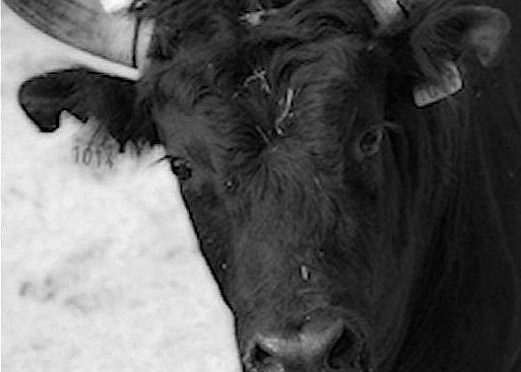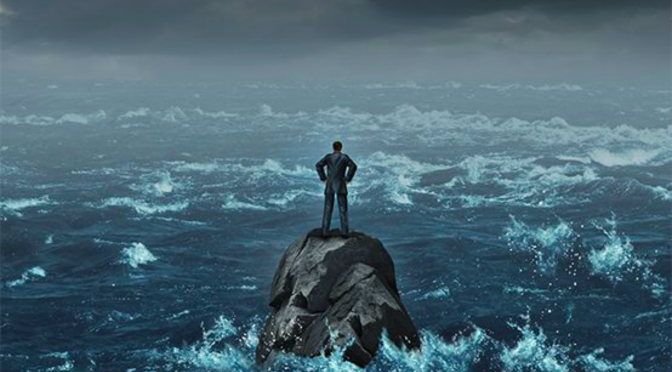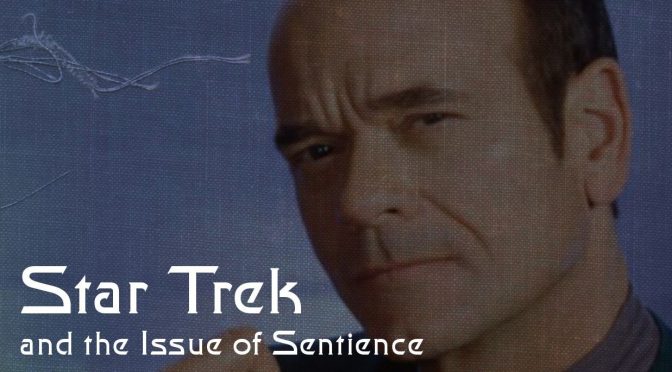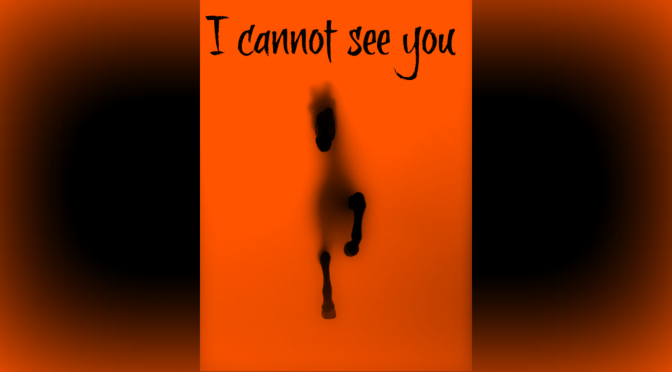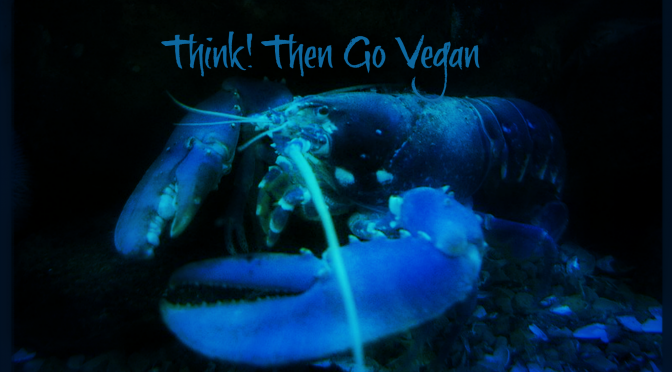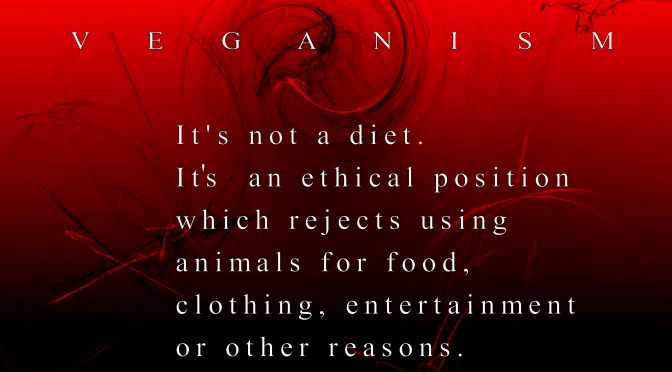Podcast: Play in new window | Download
Next time we encounter a tank of lobsters at a restaurant or “seafood” shop, we should stop for a few moments to put aside our prejudices and really look at these individuals.
In the lengthy piece “Consider the Lobster” (“Gourmet” magazine 2004) by the late writer David Foster Wallace (who sadly suicided in 2008), he spoke about the ethics of boiling a lobster alive, all for a few moments of palate pleasure and he also spoke about a lobster’s sensory neurons.
He writes:
However stuporous the lobster is from the trip home, for instance, it tends to come alarmingly to life when placed in boiling water. If you’re tilting it from a container into the steaming kettle, the lobster will sometimes try to cling to the container’s sides or even to hook its claws over the kettle’s rim like a person trying to keep from going over the edge of a roof. And worse is when the lobster’s fully immersed. Even if you cover the kettle and turn away, you can usually hear the cover rattling and clanking as the lobster tries to push it off. Or the creature’s claws scraping the sides of the kettle as it thrashes around. The lobster, in other words, behaves very much as you or I would behave if we were plunged into boiling water (with the obvious exception of screaming).15 A blunter way to say this is that the lobster acts as if it’s in terrible pain, causing some cooks to leave the kitchen altogether and to take one of those little lightweight plastic oven timers with them into another room and wait until the whole process is over.
I remember many years ago on a sea cruise I ate a lobster. I was 16 and had never eaten lobster before. The waiter put down the dish with a lobster who had been cut in half. I remember feeling slightly uncomfortable because half his head was on my plate. Major cognitive dissonance. At the same time, my speciesist belief system kicked in and I proceeded to eat this individual and I enjoyed it. But I remember this event very well. Now as a vegan, I shudder to think about it. At times, when I dare think about my past participation in animal use, I am ashamed and guilt-ridden. And I must say while composing this post, having to read Wallace’s descriptions of murdering lobsters literally made me feel nauseous.
This is the torture I put this particular individual through for a few moments of palate pleasure.
David W. Foster continues:
[i]t takes a lot of intellectual gymnastics and behaviorist hairsplitting not to see struggling, thrashing, and lid-clattering as just such pain-behavior. According to marine zoologists, it usually takes lobsters between 35 and 45 seconds to die in boiling water. (No source I could find talked about how long it takes them to die in superheated steam; one rather hopes it’s faster.)
In Maine at their Lobster Festival they boil alive 100 lobsters at a time. The unbearable fear and torture. 
Today while browsing Twitter, I came across a numerous headlines relating to this particular issue of crustaceans and pain. I have chosen one titled: “Further evidence that crabs and other crustaceans feel pain” I sighed and thought really? What was the giveaway? Desperately trying to avoid being boiled alive by thrashing about trying to push the lid off a boiling pot? These ongoing kinds of (often torturous) studies always astonish and sadden me. The unending experiments apparently trying to determine whether these non-human individuals feel pain. It makes me sigh with despair at our species’ pathetic attempts to rationalize our exploitation of the vulnerable.
Recalling my time as a nurse in a neuro-intensive care unit, many of our patients were in a coma. Although they were unresponsive except for basic simple physical reflexes, as nurses, we would talk to them, tell them what we were about to do e.g wash their face, moisten their mouth etc. We treated them with the same regard we would had they been conscious. We have such regard for our own species, even when they are comatosed, yet we are so invested in using non-human animals as resources, that we cannot even acknowledge the obvious.
If one searches online, there have been numerous scientific articles about lobsters interactions with other lobsters: their sentience, their very fine sensitive hairs on their shell etc. There have been scientific articles about other crustaceans (and fish), their sentience and also their ability to feel pain.
Here’s another excerpt from “Consider the Lobster” by David F Wallace:
There are, of course, other fairly common ways to kill your lobster on-site and so achieve maximum freshness. Some cooks’ practice is to drive a sharp heavy knife point-first into a spot just above the midpoint between the lobster’s eyestalks (more or less where the Third Eye is in human foreheads). This is alleged either to kill the lobster instantly or to render it insensate—and is said at least to eliminate the cowardice involved in throwing a creature into boiling water and then fleeing the room. As far as I can tell from talking to proponents of the knife-in-the-head method, the idea is that it’s more violent but ultimately more merciful, plus that a willingness to exert personal agency and accept responsibility for stabbing the lobster’s head honors the lobster somehow and entitles one to eat it. (There’s often a vague sort of Native American spirituality-of-the-hunt flavor to pro-knife arguments.) But the problem with the knife method is basic biology: Lobsters’ nervous systems operate off not one but several ganglia, a.k.a. nerve bundles, which are sort of wired in series and distributed all along the lobster’s underside, from stem to stern. And disabling only the frontal ganglion does not normally result in quick death or unconsciousness. Another alternative is to put the lobster in cold salt water and then very slowly bring it up to a full boil. Cooks who advocate this method are going mostly on the analogy to a frog, which can supposedly be kept from jumping out of a boiling pot by heating the water incrementally. In order to save a lot of research-summarizing, I’ll simply assure you that the analogy between frogs and lobsters turns out not to hold.
Ultimately, the only certain virtues of the home-lobotomy and slow-heating methods are comparative, because there are even worse/crueler ways people prepare lobster. Time-thrifty cooks sometimes microwave them alive (usually after poking several extra vent holes in the carapace, which is a precaution most shellfish-microwavers learn about the hard way). Live dismemberment, on the other hand, is big in Europe: Some chefs cut the lobster in half before cooking; others like to tear off the claws and tail and toss only these parts in the pot.
And there’s more unhappy news respecting suffering-criterion number one. Lobsters don’t have much in the way of eyesight or hearing, but they do have an exquisite tactile sense, one facilitated by hundreds of thousands of tiny hairs that protrude through their carapace. “Thus,” in the words of T.M. Prudden’s industry classic About Lobster, “it is that although encased in what seems a solid, impenetrable armor, the lobster can receive stimuli and impressions from without as readily as if it possessed a soft and delicate skin.” And lobsters do have nociceptors, (17) as well as invertebrate versions of the prostaglandins and major neurotransmitters via which our own brains register pain.
Lobsters do not, on the other hand, appear to have the equipment for making or absorbing natural opioids like endorphins and enkephalins, which are what more advanced nervous systems use to try to handle intense pain. From this fact, though, one could conclude either that lobsters are maybe even more vulnerable to pain”
Seriously, here’s a little tip off for anyone still questioning whether these individuals feel pain. They do their best to avoid harm. They defend themselves against possible harm. And as I mentioned earlier, they struggle desperately to climb out of a pot of boiling water. I mean seriously! It’s not difficult at all if one is paying the least bit attention to see that crustaceans feel pain and what’s more they are sentient. We just choose not to acknowledge it– just as we choose not to acknowledge that other animals are sentient–so we can continue to exploit and murder them (for convenience and trivial reasons). This failure to acknowledge other species’ basic right not to be used as property is the result of our unrelenting speciesist indoctrination from the time we were born.
And we do it, because we can.
I wish to share with you a few relevant quotes from an excellent blog: UVE Archives which explains speciesism:
Racism and speciesism are both the same wrong of ignoring morally relevant characteristics, such as sentience, in favor of morally irrelevant characteristics, such as species or race membership. Just as racists find it very difficult to see anything wrong with their racism, speciesists find it very difficult to see anything wrong with their speciesism.
Speciesism (like racism, sexism, and heterosexism) is the epistemically irrational prejudice of favoring one or more species over other species without a morally relevant characteristic providing justification. From the standpoint of irrational, unjustified prejudice, ignoring the morally relevant characteristic of intelligence in preventing certain classes of humans from obtaining an education is the same as ignoring the morally relevant characteristic of sentience in exploiting and killing nonhuman animals for food, clothing, research, and entertainment (all of which are unnecessary).
Speciesism is one form of irrational, prejudiced compartmentalization. An example of speciesist compartmentalization is when we pet and love a dog while a pig’s full body and head rotate over a fire pit. Why isn’t it the other way around? Better yet, why don’t we pet and love both the dog and the pig?”
Whether non-human animals express emotions and responses we can recognize or identify with or whether non-humans display “intelligence” like ours is irrelevant as to whether they deserve at least one right — the right not to be used as property. All that matters is sentience. Whether they feel a little pain or a lot of pain, whether they are “like us” or not, the issue is that we have no right to torture and murder other animals. We have no right to use these individuals as resources just because they are from another species.
Finally I would like to share this quote about sentience and speciesism from a blog post titled: “A Matter of Life and Death”
We consider killing humans to be wrong regardless of the individual’s cognitive abilities, moral capacity, mental health, sex, race, nationality, age, or sexual orientation. It doesn’t matter whether the person in question is terminally suffering from dementia, psychologically ill, severely retarded or a productive genius – we believe it to be seriously wrong in all cases. If we consider any given case to be particularly egregious, it is often due to the individual’s vulnerability, not to any mental or moral characteristics he or she may possess.
By stark contrast, the majority of us act as if there is absolutely nothing wrong with unnecessarily killing a member of certain other species of sentient beings. But what rational basis do we have for such a discrepancy in our perception? What quality is found in all and only humans that could possibly point to the conclusion that the lives of other animals are unimportant?
Let’s remember this next time we pass by a tank of lobsters in a restaurant. Let’s stop and really look at them. Let’s put aside long held beliefs that they are “things” or “food” and instead, recognize that they love life; that they are individuals and let us remember, they are in this terrible situation because we are not vegan.
Let us stop pretending that other animals’ lives do not matter to them, that it’s acceptable to exploit them as long as we do it “humanely”. Let’s stop pretending that there’s such a thing as non-abusive use of animals, because if we do our research — instead of believing industry and large animals organisations — there is no such thing as “humane” use and even if there were, it would still be unjust. Let’s stop believing our own supremacist notion that we are the ONLY species on the planet that is important and all others are just here for us to use.
Just to give a little perspective. Today 150 million nonhuman sentient individuals–who loved life just as we do, and who are like our nonhuman family members whom we love so much– were tortured and murdered, mostly for our palate pleasure. Many many more sea animals suffered the same fate. When we are not vegan, we are participating in unspeakable acts of violence every day that we eat, wear and use other animals. We are contributing greatly to the planet’s ecological meltdown as 51% of greenhouse gases are from animal use industry according to a 2009 Worldwatch Institute report.
We need to regain our connection to the planet, and recognize our interconnectedness to the millions upon millions of other species who share it with us. Please! Let’s stop our participation in violence and end our self-deception.
Please go vegan. It’s not a hardship. Far from it. Being vegan brings more and more happiness into our lives as time passes. Becoming vegan will be one of the best decisions we make in our lives and it will be a first step to a nonviolent life.
I will leave you with a quote from a wonderful Zen master Thich Nhat Hanh: “We are here to awaken from our illusion of separateness”
Thank you for your consideration 🙂

